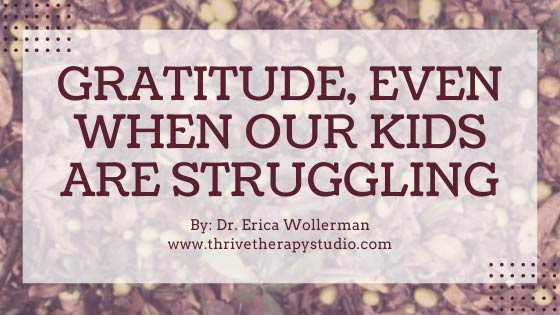Around this time of year, the idea of being thankful and grateful seem to be pretty popular. While I am definitely a believer in practicing gratitude and even developing family practices around gratitude, I think there is an area we can all practice gratitude in that is often missed. This is with our children.
Like I said, I do think that practicing gratitude with our children is incredibly helpful for them and for us. But what I want to talk about today in this blog is practicing gratitude FOR our children.
Often, I find that by the time parents have reached out to me for support either for themselves in parenting or for their child(ren) or teen(s), they have become quite overwhelmed, frustrated, and sometimes even kind of fed up with their kids. Similar to couples therapy, where often couples call when it is seeming to be “too late” for their marriage, parents call when they feel there is nowhere else to turn for their child or teen to get help. Then, they call us with a HUGE list of things that they would like their child/teen to work on. They need to eat better, show better behavior, clean up after themselves, do their homework, be respectful, work on their social relationships, work on their family relationships, play video games less, play outside more – and the lists go on and on sometimes.
While I think this is a totally relatable and understandable situation to find yourself in, I think that we do not necessarily talk about how to shift the dynamic that can happen in a family when it seems that parents are focused more on what their child/teen needs to work on and less on who they are and how great they are already. Practicing gratitude for our children and who they are in an active way each day can certainly help shift that attitude and somewhat negative dynamic.
I would encourage any parent who is feeling frustrated with their child or teen to consider trying this out. Take aside 10 minutes a day to make a list of 10 different things they are grateful for about their child. Perhaps try this out for 21 days (as that is the number of days research shows to be habit forming) and see if it shifts your perspective and even your relationship with your child. It would be even better if you keep going after the 21 days and if you share your list with your child/teen!
What I find is that often, a child who is struggling KNOWS they are struggling and difficult to be around even if they won’t admit it to their families. The more parents focus on the challenges a child is having, the more the child feels like the “problem” child. Expressing and showing gratitude for the things they do well but also who they are as a person helps to teach them that they have worth outside of their accomplishments and that they are more than their areas of difficulty. This is valuable beyond measure in our world so focused on what we do and accomplish!
We at Thrive wish you and your families a very happy holiday season! Our blogs will be posted less frequently this time of year but we will do our best to keep them coming as much as we can!
Reach out to start
your healing journey


